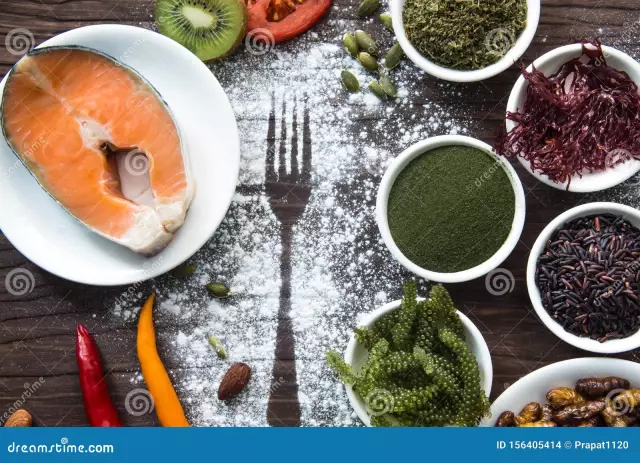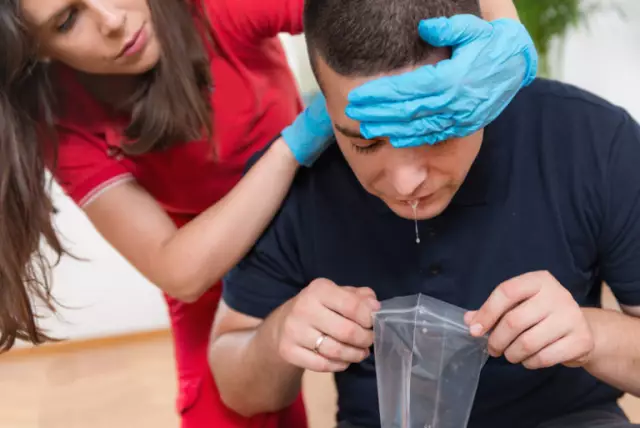- Author Rachel Wainwright wainwright@abchealthonline.com.
- Public 2023-12-15 07:39.
- Last modified 2025-11-02 20:14.
Food poisoning

If, after eating, you suddenly feel a sharp stomach pain, nausea or dizziness, then know that one of the most common causes of such symptoms is food poisoning. This problem occurs after eating foods that have been contaminated with bacterial poisons or impurities of various chemicals. From our article, you will learn about the symptoms of food poisoning, their causes, the development of the disease, as well as the provision of urgent medical care for food poisoning to a patient and measures that help prevent such situations.
Types of food poisoning
All food poisoning can be roughly divided into two large groups: bacterial and non-bacterial. The first group includes problems caused by bacterial poisons, viruses and bacteria. Non-bacterial food poisoning in children and adults occurs due to the ingestion of chemicals or after the consumption of poisonous mushrooms and herbs. Given the many causes of food poisoning, you shouldn't be surprised at the variety of symptoms. Patients may experience stomach pains, persistent vomiting, nausea, and high fever, and in the most severe cases, renal, hepatic, and neurological syndromes. They cause serious complications, so if there is any suspicion of food poisoning, treatment should begin as soon as possible. Desirablethat the patient was provided with first aid even before the arrival of doctors. We will tell you how to do this in the corresponding section of our article.
In the meantime, let us dwell on bacterial poisoning in more detail. As a rule, they are provoked by the consumption of food, which contains pathogenic microbes and toxins. The causative agents of food poisoning are: Proteus, Klebsiella, Clostridia, Staphylococcus, Escherichia coli strains and other microorganisms. They accumulate in food when sanitary and hygienic standards are violated in food production enterprises, as well as during improper transportation and storage. It should be noted that food poisoning, the symptoms of which usually appear almost immediately after eating poor-quality food, can develop even with prolonged heat treatment of food. This is due to the fact that staphylococci and many other types of microbes are resistant to boiling and feel good when exposed to high temperatures.
How to tell if food is contaminated? First of all, you should pay attention to its smell, taste and color. Spoiled foods give off a specific unpleasant odor and taste sour. In addition, their consistency changes. Gas bubbles are one of the clear signs of unsuitable products. They are especially noticeable on the surface of milk and other liquid food. However, signs of food poisoning may appear even after eating foods with normal organoleptic qualities. This situation develops, for example, in cases where toxins enter the body with food prepared by an infected person.
Symptoms of food poisoning
The clinical picture of food poisoning depends on the type of pathogens and the amount of unsuitable food eaten. The most common signs of food poisoning are:
- temperature rise;
- loss of appetite;
- loose stools;
- constant calls to defecate;
- blurred vision;
- nausea, vomiting;
- increased salivation;
- individual disorders in the work of the central nervous system or a complete failure of the entire nervous system, which often happens with botulism.
The first symptoms of food poisoning appear within 30-40 minutes after eating contaminated food. Over the next 2-3 days, they grow. During this period, the patient should be provided with urgent help with food poisoning. Otherwise, there is a very real risk of death or the development of severe complications that can lead to disability and loss of performance. In this regard, infections such as botulism and listeriosis are especially dangerous. The first is characterized by an extremely rapid progression, and the second is characterized by the absence of visible symptoms of food poisoning. In pregnant women, listeriosis leads to fetal pathologies and early childbirth, so expectant mothers should be very careful about the choice of food.
First aid for food poisoning

If there is a suspicion that nausea, vomiting and other warning symptoms are caused precisely by food poisoning, you should immediately rinse the stomach with a weak solution of manganese or soda. Rinsing is done until clear water comes out. Also, a patient with food poisoning should drink activated charcoal with plenty of liquid. It is better to refuse carbonated drinks in favor of fruit drinks or tea. Drinking plenty of fluids will help compensate for dehydration, which inevitably develops with severe vomiting and diarrhea.
Currently, for food poisoning, as well as for severe alcohol intoxication, modern sorbents are used, one of which is White Coal. The drug effectively absorbs toxins and removes toxins, but at the same time does not remove useful substances necessary for the body. What is especially worth noting is that White Charcoal is a "concentrated" sorbent and instead of a handful of black charcoal familiar to many, you can drink only 1-2 tablets of white.
After washing the stomach, in case of food poisoning, the patient must be provided with peace, apply a heating pad to his legs and wait for the arrival of doctors. You can give the patient sulfonamides (phthalazole, sulgin) or antibiotics. Remember only that if food poisoning develops in children, taking any potent drugs must be coordinated with specialists.
Prevention of food poisoning
You can minimize the risk of food poisoning by following simple but powerful rules:
- keep the kitchen and living quarters clean;
- follow basic rules of personal hygiene;
- use only products from well-known, well-established manufacturers for food;
- store perishable food in the refrigerator;
- comply with the requirements that are established by manufacturers, in particular, use canned food during the specified date;
- keep trash bins closed;
- wash products thoroughly before use and do not forget about heat treatment.
YouTube video related to the article:
The information is generalized and provided for informational purposes only. At the first sign of illness, see your doctor. Self-medication is hazardous to health!






